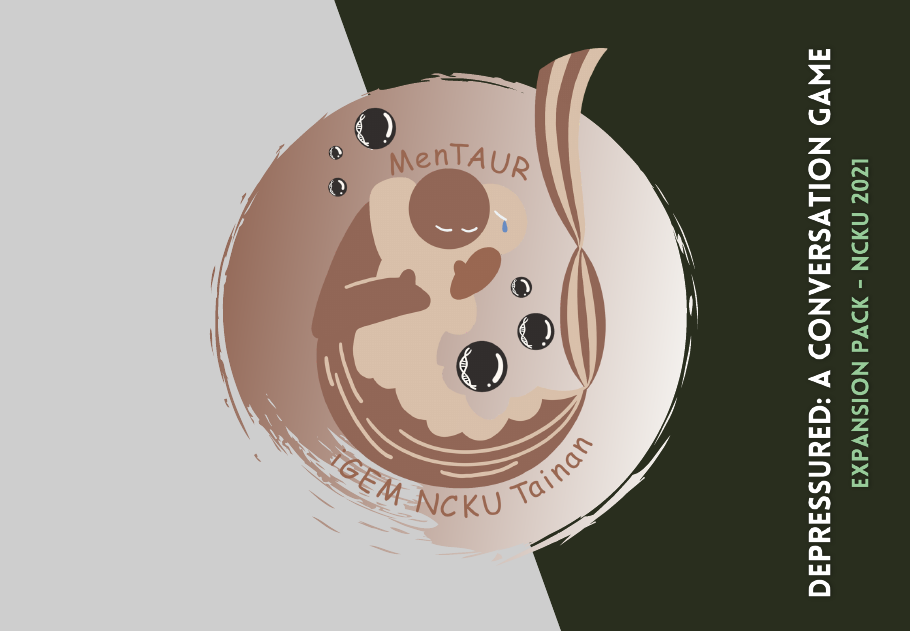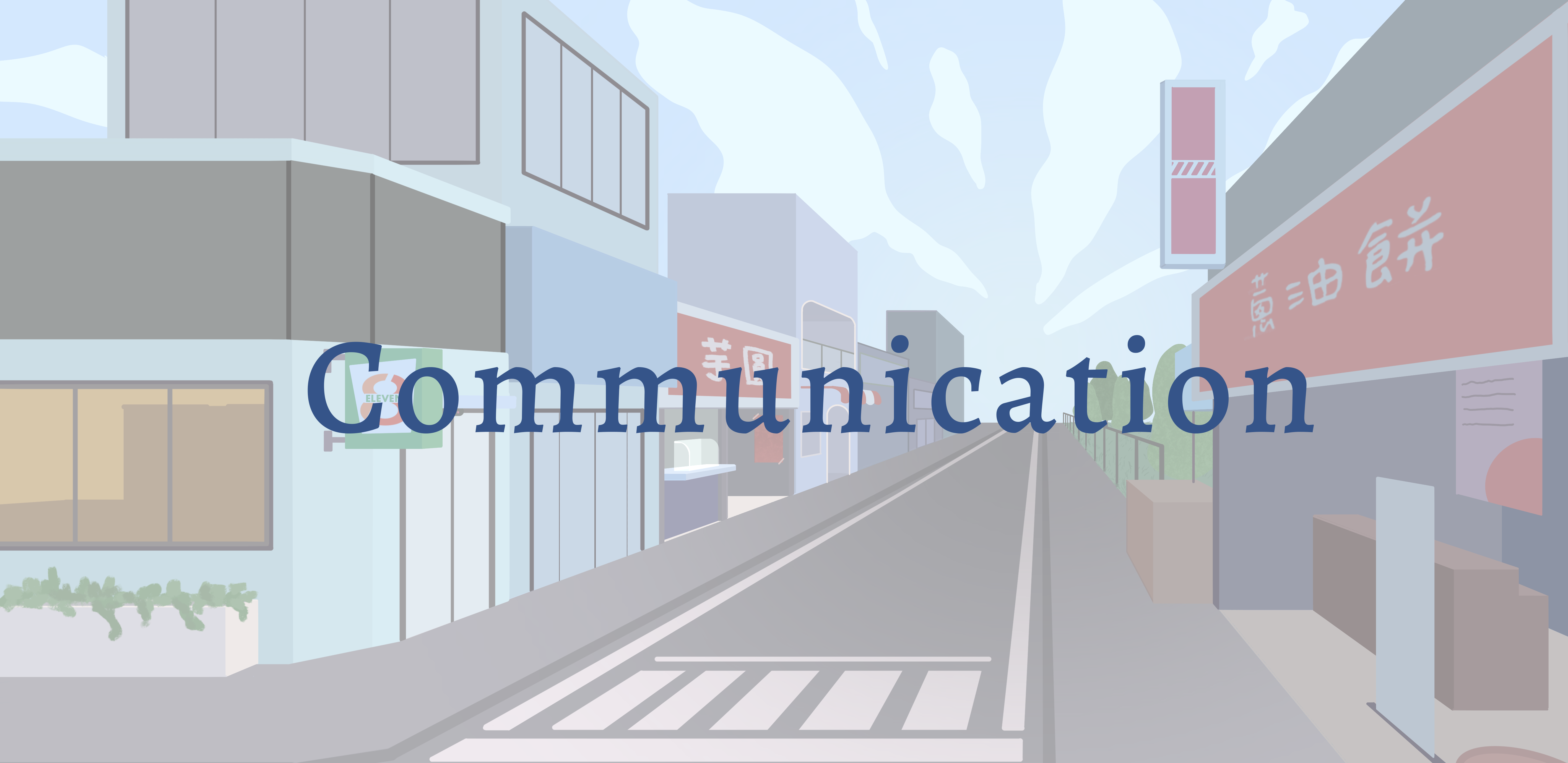
Overview
Since our target this year is chronic stress-induced depression, we want to deliver our idea amidst this pandemic outbreak to the world. We believe communication should be two-way. Hence we do not only provide but also listen to feedback from the public. Engaging with diverse groups helps us mature our project and understand exactly where the current issues lie. In return, we provide educational content to the public ranging from synthetic biology to mental health issues. Synthetic biology itself is still a controversial topic among society, unfortunately. Our team is currently working on a challenging topic that revolves around heavy stigmas with a controversial method that makes it so difficult to gain public support. Thus, our main objective is to eradicate the misconceptions surfacing in the community.
We have come up with various ways to achieve our objective. For better efficacy, we divided some of the educational contents based on understanding, from elementary level to university level. But most of them should still be understood by the public. Due to the pandemic, most of our content was delivered through online platforms. We also organized a special event along with a long-term online exhibition in Gather Town. Please scroll down to find out more about what we have done so far!
2021.02.27
NCKU Bike Festival
2021.03.04~05
Club Festival
2021.03.31
iGEM Topic Presentation
2021.04.12
President Meetup
2021.05.01~30
Podcast
2021.05.21~30
Booklet
2021.07.03
Taiwan Conference
2021.05.21~30
Momentizing
2021.09.04
Gather Town
Engagement
As for the engagement, part is regarded as an essential bridge for us to connect science, technology, and the world. Not only did we target delivery of the values of synthetic biology to society in this part, but we also attempted to explore a more profound impact and practical application of our lab research. So far, we have developed solid and successive connections of different universities, and what's more, we have attempted to build close contact with the local synthetic biology enterprise. During the pandemic, we adapt ourselves to utilize different methods to complete our project. Through various platforms of an online meeting, we effectively promoted our project to the public. We sought a higher reach of public concerns with the depression issues and the synthetic biology application in society.
NCKU Bike Festival
NCKU Bike Festival is an open house event held by National Cheng Kung for the public, mainly high school students, to inquire about majors and organizations available in NCKU. We were very enthusiastic about this festival because this was our first opportunity to introduce our team. Our objective was to teach synthetic biology to high school and university students in Taiwan. To let them have a better understanding, we utilized Lego parts as BioBricks. We explained synthetic biology and BioBricks to them beforehand, then asked them to assemble a BioBrick using Lego parts according to their functions. We also built an E. coli costume to attract more visitors and held a mini-game where the participants could trap the E. coli using a Hula Hoops which represented a plasmid. This method turned out to be successful in attracting visitors to our booth! As expected, most of them had never heard of iGEM nor synthetic biology before coming to our booth. But after our explanation, they started to know about this subject and even gave us some ideas for our project.
iGEM Topic Presentation
After each individuals' brainstorming session, we were divided into three sub-teams with our topic choices this year. Our team invited audiences from different fields, such as professors, doctors, administration, and students to take part in our topic selection. We believe gaining feedback from various perspectives allows us to recognize the shortcoming of the topic candidates. It also provides us with vulnerable insights that we can take into account when deciding the final topic. Each sub-team was required to conduct a 20 minutes presentation and 10 minutes Q&A session with the audience. We adopted the voting system for final topic selection, and that is how MenTAUR was born.
Undergraduate Research Day
National Cheng Kung University (NCKU) has always been encouraging students to develop their learning and research potential. Last year, National Cheng Kung University’s Research and Development Office held the first-ever "Undergraduate Research Day", and invited iGEM NCKU Tainan to share about our research experience to stimulate more students to explore the world of research. This year, Undergraduate Research Day was held again - this time at a much bigger scale. We were honored to be given a chance to present again this year. Not only did we talk about iGEM and our project, we also shared about how and why we chose depression as our project. After our presentation, numerous people contacted us to ask about iGEM. We hoped that through our experience sharing, we are able to increase college students’ interest in iGEM, as well as academic and interdisciplinary research.
NCKU Club Festival
National Cheng Kung University (NCKU) holds a club festival every semester to introduce all clubs to the freshmen students. We took the chance and participated in the festival to promote our upcoming topic presentation and invite as many people as possible. But we had to explain synthetic biology to most people at first because it is not well-known among the students. Although we had a fixed booth, we chose to walk around and engage with more people. We even shared with other clubs about synthetic biology and our vision. People seemed interested in our project and gave us a lot of encouraging support.
Taiwan Conference
Due to the pandemic, the conference with other Taiwan iGEM teams had to be online via Microsoft Teams. We appreciate iGEM CSMU for hosting the conference, as well as other teams that participated in it. Each group was required to present their project for around 20 minutes before entering the Q&A session. Thus, we could think more critically about the blind spots in our project and exchanged ideas about possible collaborations through the discussion. Thanks to this conference, we were able to meet iGEM CCU and formed a partnership with them.
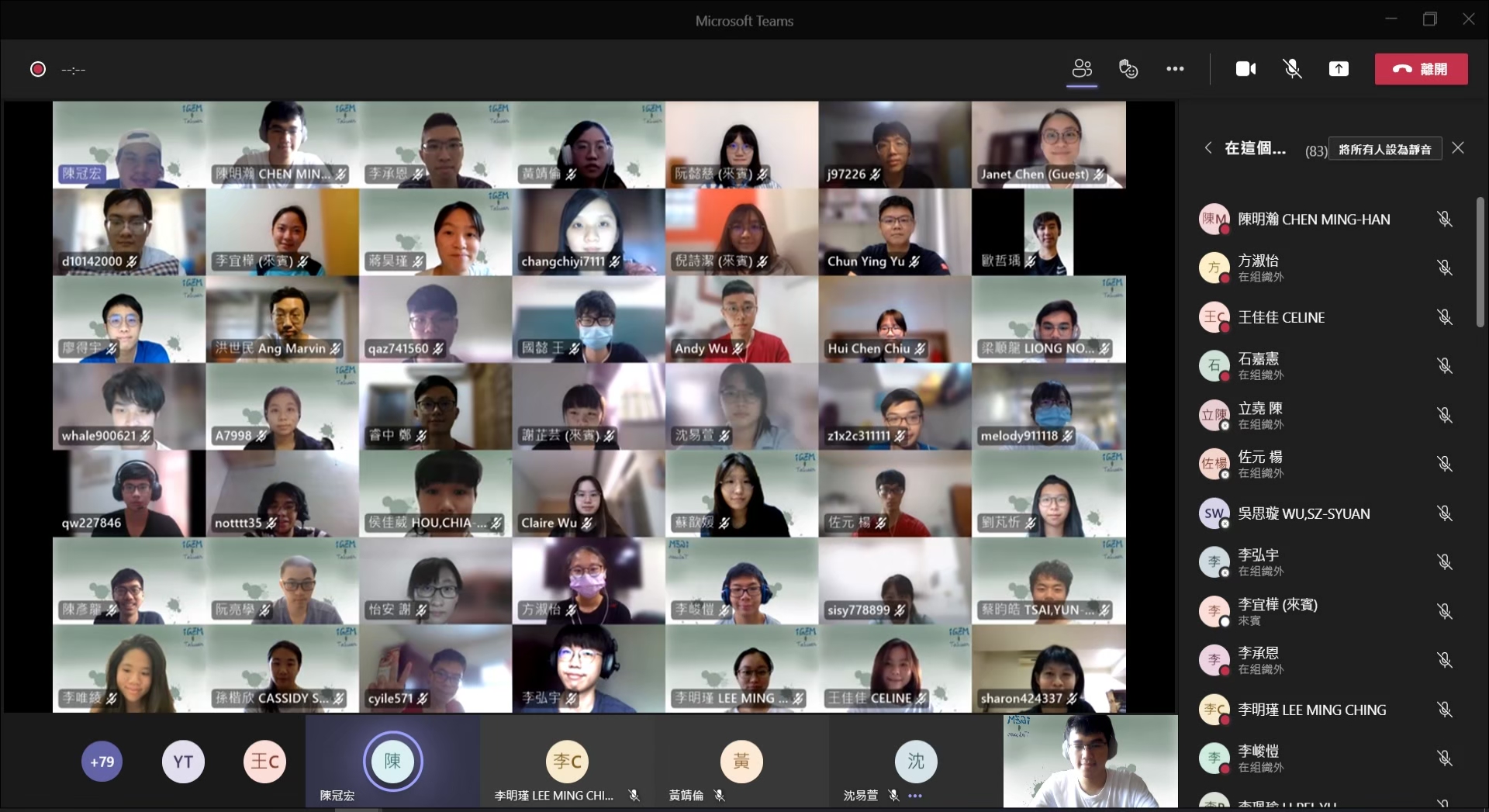
NCKU President Meetup
In April 2021, we had lunch with the President of National Cheng Kung University, Dr Huey-Jen Jenny Su. The president has been rooting for iGEM NCKU_Tainan since 2016, and we thank her for the support. While having lunch, we filled in more details to President Su about our project this year. She provided many suggestions to improve the project, such as deciding on our target audiences and understanding our purposes. We kept this in mind when designing every step of our project.
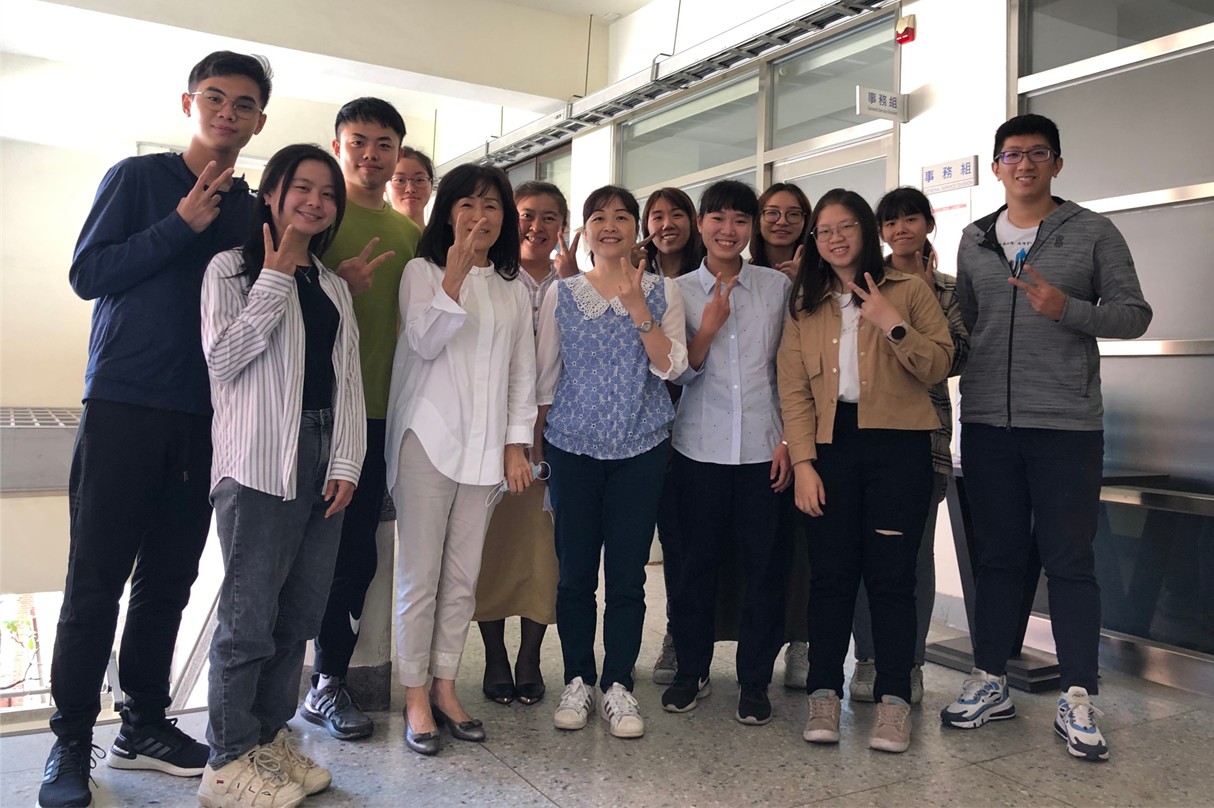
Education
One of our highlights in human practices is education. Based on previous engagements with other people, many of whom are still misled by the information and existing stigmas, we have the urge to debunk the misconceptions about synthetic biology and mental health issues. With adequate education, humanity can keep improving and overcome the obstacles they face. Thus, we have made several attempts on sharing our knowledge with the public as below.
Podcast
At first, we were thinking about how to promote our content to the public in this pandemic. Then, we came up with the idea of owning a podcast channel called Tea Time (聊鬱), where we talk about various subjects but still within synthetic biology and mental health issues. We have also invited the 2019 iGEM NCKU_Tainan leader, Sabrina Yeoh, as our first episode's guest speaker sharing her experiences in iGEM. Other than that, we wanted to raise mental awareness and provided some content talking about mild depression. The language switched between English and Chinese. Try listening to our podcast by clicking the link below!
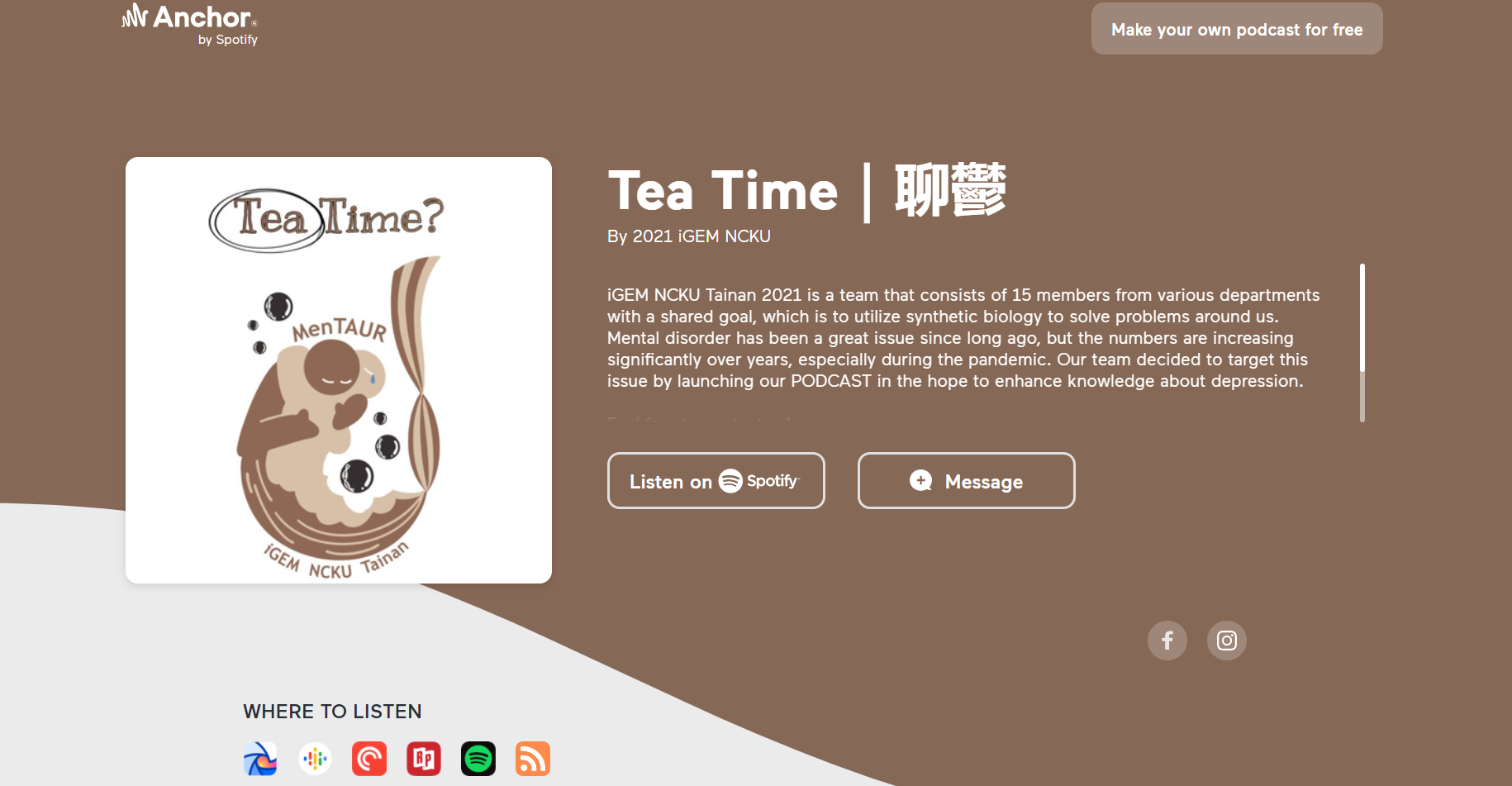
Booklet
The number of people moving to Taiwan has been increasing over the years. One of the common groups is probably international students. Being far away from somewhere familiar must be hard for most of them. Not to mention the cultural difference and language barrier often cause difficulties making it harder to adapt. Under this kind of situation, their mental health tends to be more vulnerable. But it might be hard for them to gain mental resources because, honestly, Taiwan doesn't offer many mental resources. Thus, we created this booklet for foreign nationals in Taiwan. Although the content is about how they can seek mental help in Taiwan, we also included English service resources. Furthermore, it is available in three languages: English, Chinese, and Indonesian. We have distributed the booklet in the dormitory, international student office, and overseas Chinese student office.
Momentizing
Momentizing is an organization created by Estrelita Gracia that provides informative mental health support through the discussion forum, support group, and counseling service. They are one of the rare Taiwan-based mental health organizations that provide services in English and Bahasa. Thus, we contacted them for a collaboration, and they accepted our offer. It is our honor to be able to interview the founder of Momentizing about mental health issues.
Time stamps: 00:00 Introduction 01:43 Is stress one of the biggest depression causes? 05:51 Is it possible for us to recognize depression and how can we differentiate temporary sadness and depression? 08:56 Current stigmas about depression (especially in Taiwan) and does knowing the fact we have depression is better for us? 13:31 How do we know when to seek for help? 19:10 How to break the cycle of stress ‘transforming’ into depression?

Education Kit
Inspired by our team’s bubble experiment, we created an education kit for elementary school students for first-hand making sodium alginate bubble experience. Inside the kit contained around ten bubble experiment kits, each consisting of 0.1g sodium alginate (package A) and 0.15g calcium chloride (package B). We included instructions and manuals along with the kits, warning them not to consume the experiment product. Other than that, we included our grid-comic of synthetic biology introduction, booklet, and some other souvenirs like folders and coasters.

Depressured Card Game
Brought together by mental health-related topics, iGEM SDU Denmark, iGEM Moscow, and iGEM NCKU_Tainan designed a learning-based card game. Depressured card game contained 6 packages with a total of 120 flashcards teaching about depression and each of our project topics. Our flashcards not only contained scientific-based Q&A, but some of them were also reflective questions that will get people to think and reflect on their own emotions and feelings. Furthermore, we also provided some guides on how to find relevant information about depression and seeking help for those who are in need. The game is available in four languages: Chinese, Danish, English, and Russian. For easier access, we uploaded the card game to Quizlet, where participants quickly accessed the game. We hope we can share more knowledge and raise mental awareness in the community through this game.
2021 NCKU iGEM Special Project
Introduction
Upon our market research, we have concluded that most of the public is still wary of GMOs, mainly due to lack of knowledge. Therefore, we were inspired to hold a study camp sharing our knowledge about synthetic biology with middle and high school students. We believe introducing synthetic biology to those at a younger age can clear the existing misconceptions regarding GMOs. Therefore, on September 4, we held an online synthetic biology themed summer camp on an online platform called Gather Town. The room introduction and event schedule can be found here:
Content
Presentations
We prepared four topics for this session: Taurine, mild depression, synthetic biology, and iGEM. The students were split into three different rooms for the first three topics, with one member delivering the lectures for each subject. After that, the participants were divided into three groups, taking turns listening to the lessons every 15 minutes. A Q&A session was offered after the presentation by our member ended. After that, everyone gathered in another room where we introduced our project and iGEM.
Game
Besides presentations, we also led the students in a game called 'Catch!'. We divided the participants into two groups. Each group picked out a representative as 'Ghost' while the rest were 'Human'. They had to find the hidden treasures before being arrested by the 'Ghost'. Apart from playing, we included some questions related to our lectures to help them review more thoroughly. When someone was eliminated, they were redirected to a room where our members kept them company.
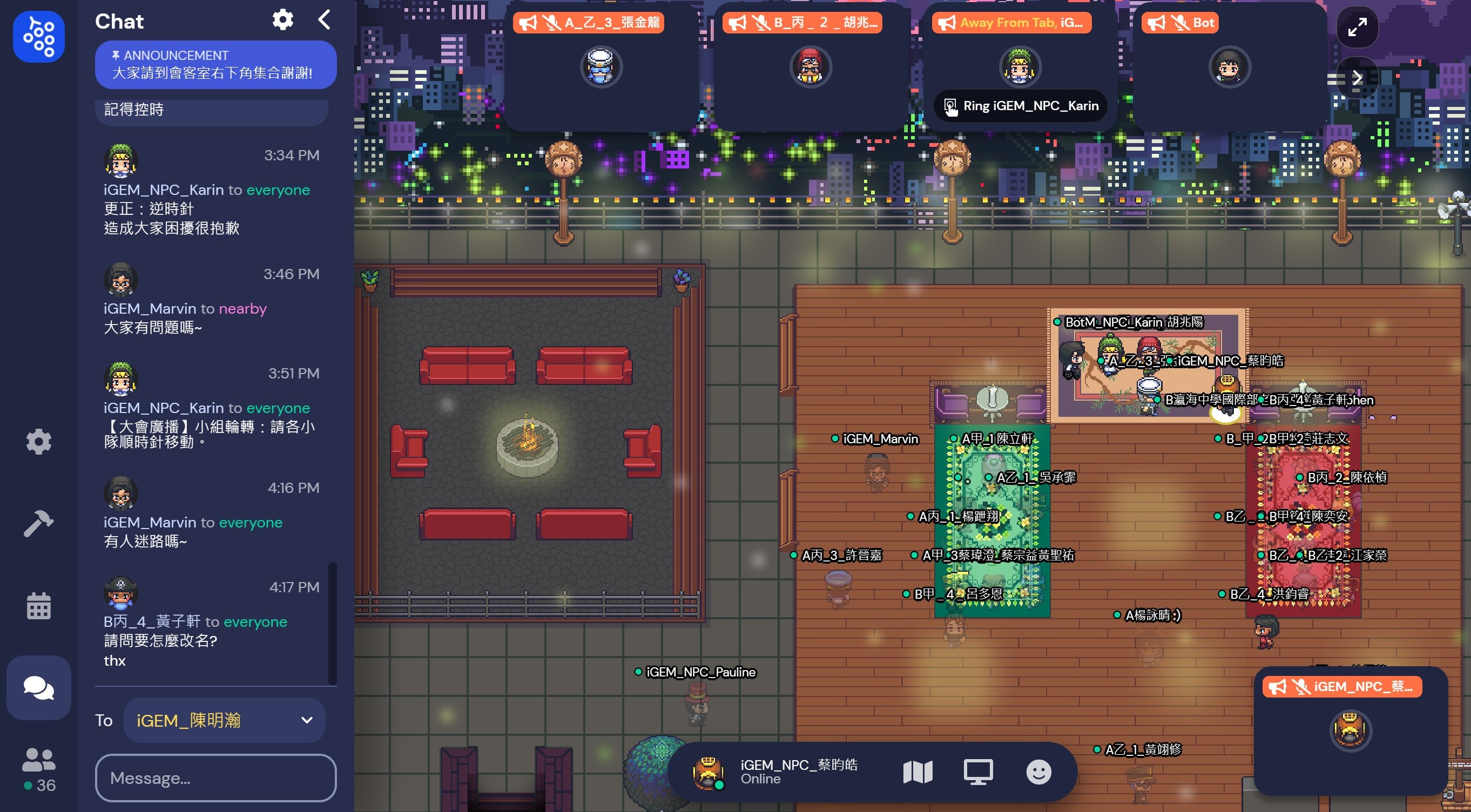
Brainstorming
After explaining the synthetic biology concepts to them, we arranged them into four groups to brainstorm. Each group was required to solve a problem using synthetic biology and prepare a 5-minute presentation of their idea. During the discussion, we assigned one assistant teacher to each group to keep them engaged. As a result, most of the participants came up with exciting ideas, as listed below, which meant they gained a basic understanding of synthetic biology.
Group 1: Inoculate alfalfa plants against overly salty soil
Group 2: Using CRISPR-Cas9 to convert photosynthesis energy into useable energy for human
Group 3: Recombinant protein vaccine
Group 4: Using gene transplant to modify the size of cats

Feedback
Before ending the session, we asked the participants to complete a feedback form, in which they received many positive comments. Some of the participants even asked us to hold another physical camp. Unfortunately, Taiwan is still under COVID-19 restrictions, so it was not possible at the time. Nevertheless, we are delighted that this camp was a positive experience for the students.
Long-term Exhibition
Apart from the study camp, we also held an exhibition in Gather Town for people to learn about iGEM and our project whenever they want. You may visit the exhibition whenever you want!
Exhibition portalClosing
We were given a chance to introduce our synthetic biology and our project to high school students through this study camp. Hopefully, we can spark their interest in synthetic biology and clear the misconceptions about GMOs. We especially thank Mr. Stephen from Ying Hai High School for accepting our proposal and accompanying the students throughout the session. We also thank all of the participants who joined our study camp!




















